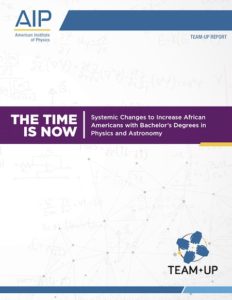 The National Task Force to Elevate African American Representation in Undergraduate Physics & Astronomy, known as TEAM-UP, was chartered and funded by the American Institute of Physics to examine the persistent underrepresentation of African Americans in physics and astronomy in the United States
The National Task Force to Elevate African American Representation in Undergraduate Physics & Astronomy, known as TEAM-UP, was chartered and funded by the American Institute of Physics to examine the persistent underrepresentation of African Americans in physics and astronomy in the United States
In its report, The Time Is Now: Systemic Changes to Increase African Americans with Bachelor’s Degrees in Physics and Astronomy, the task force discusses the five factors it discovered as responsible for the success or failure of African American students in physics and astronomy: belonging, physics identity, academic support, personal support, and leadership and structures.
TEAM-UP’s two-year investigation included student and faculty surveys, in-person interviews with African American students, and site visits to high-performing physics departments in colleges and universities. The report is calling for a new way of thinking to solve this persistent problem, and it outlines research findings into each of the five factors with recommended changes to address issues within the factors.
According to the TEAM-UP report, “The persistent underrepresentation of African Americans in physics and astronomy is due to (1) the lack of a supportive environment for these students in many departments, and (2) the enormous financial challenges facing them and the programs that have consistently demonstrated the best practices in supporting their success.”
The report calls on the scientific community to foster a sense of belonging for African American students within physics and astronomy programs by creating environments that are welcoming and promote the feeling that students are valued through departmental practices, and faculty, student and peer interactions.
“A systemic problem needs a systemic solution,” said task force co-chair Ed Bertschinger, physics professor at Massachusetts Institute of Technology. “The presence or absence of caring faculty members can make the difference between a student persisting or leaving. Department leaders choose the faculty and signal to them what’s important, as does the profession at large. The culture of physics and astronomy today affects discoveries that will or won’t be made by these scholars in the future.”


As an engineer that has been in the profession since 1996, I have experienced racism in many forms from isolation from accessing OJT to knowing too much when I was (according to them) suppose to be seen and not heard (so the powers that be could say we have one). If it was not for my ethic in continuous improvement and staying current with technology I would have been pushed out of the industry a long time ago.
I attended both HBCUs and HWCUs obtaining several graduate degrees along the way. The realization I encountered was at the HBCU I was judged on my merit, but not so on several occasions at the HWCU.
Therefore, the need is not to patronize because that dulls the explicit learning process, but the prerequisite for the HBCUs is to step up their game in research by demanding and paying the faculty to draw like individuals as learners.